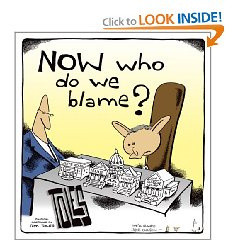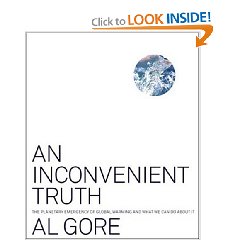
First-Person Account, No Notes,
It also falls second to “The Winds of Change” and to “The Weather Makers” (I tend to read books in sets to tease out varying perspectives), and ties with “Plows, Plagues, and Petroleum.”
The author's most exciting idea, absolutely worthy of global implementation, is to call for the marking of all products with their “water content.” He is stunningly education, truly original within my reading as reviewed at Amazon when he itemizes the amount of water needed to create a pound of rice or any of a number of other products. I would advise any future leader to demand that products be labeled as to their water content, their oil content, and their chlorine content (see my review of Joe Thorton's “Pandora's Poison: Chlorine, Health, and a New Environmental Strategy.”
The author notes that the US is exporting ONE THIRD of its water in the form of products that consumed that amount of water.
Other highlights from this book, for me personally:
Six water winners are Brazil, Canada, China, Colombia, Indonesia, and Russia, with Mongolia as a water wild card.
Treaties about water are out of date. Technologies, including cement as an answer for re-directing water, are mis-directed.
97% of the world is sea water–this suggests that we need a MASSIVE global desalination program to protect aquifers from further salination and deterioration (from my own experience: $100M will buy a desalination plant capable of desalinating 100M cubic meters of water a year, or Navy ship or an Army brigade with tanks and artillery, or 1000 diplomats, or 10000 Peace Corps missions, or a day of war over water. It's about trade-offs, and we and not making them wisely.
Kashmir is about Pakistan's Achilles heel, water.
India is on a path to destruction. “Water mines” are selling water for $4.00 (four dollars) a TRUCK TANKER LOAD, and basically mining India dry. When the author comments about a “spate of suicides” among Indian farmers, he fails to mention that this number runs toward 2,000 a year dead by their own hand. He predicts aquifer busts in India and China within 20 years, at which point, as other authors discuss more ably, disease, migrations, crime, and poverty will be as plagues unto those two nations.
Dams produce methane from rotting vegetation, with 8X the greenhouse effect of a coal powered plan of the same capacity. This should in the author's view change the Kyoto calculations. The author is very strong on this point, and suggests that breaking down dams and not building more (e.g. China) should be right up there with global warming as issues for action.
He notes that the 6 day war in the Middle East was about water, but neglects to mention that Israeli agriculture is using up 50% of the water stolen from the Arabs through underground pipes, yet produces less than 5% of Israel's GDP.
I was most taken with the author's discussion of “barefoot science” which emerging during his discussion of toxic or poisoned water such as found in Bangladesh. He cites with great admiration one individual who went from village to village testing wells, with very crude tools, providing reliable estimates of toxicity for 10 cents per well.
A fine book, some excellent insights, but it did leave me a bit cranky. Marq de Villier's book is still the best in class.








